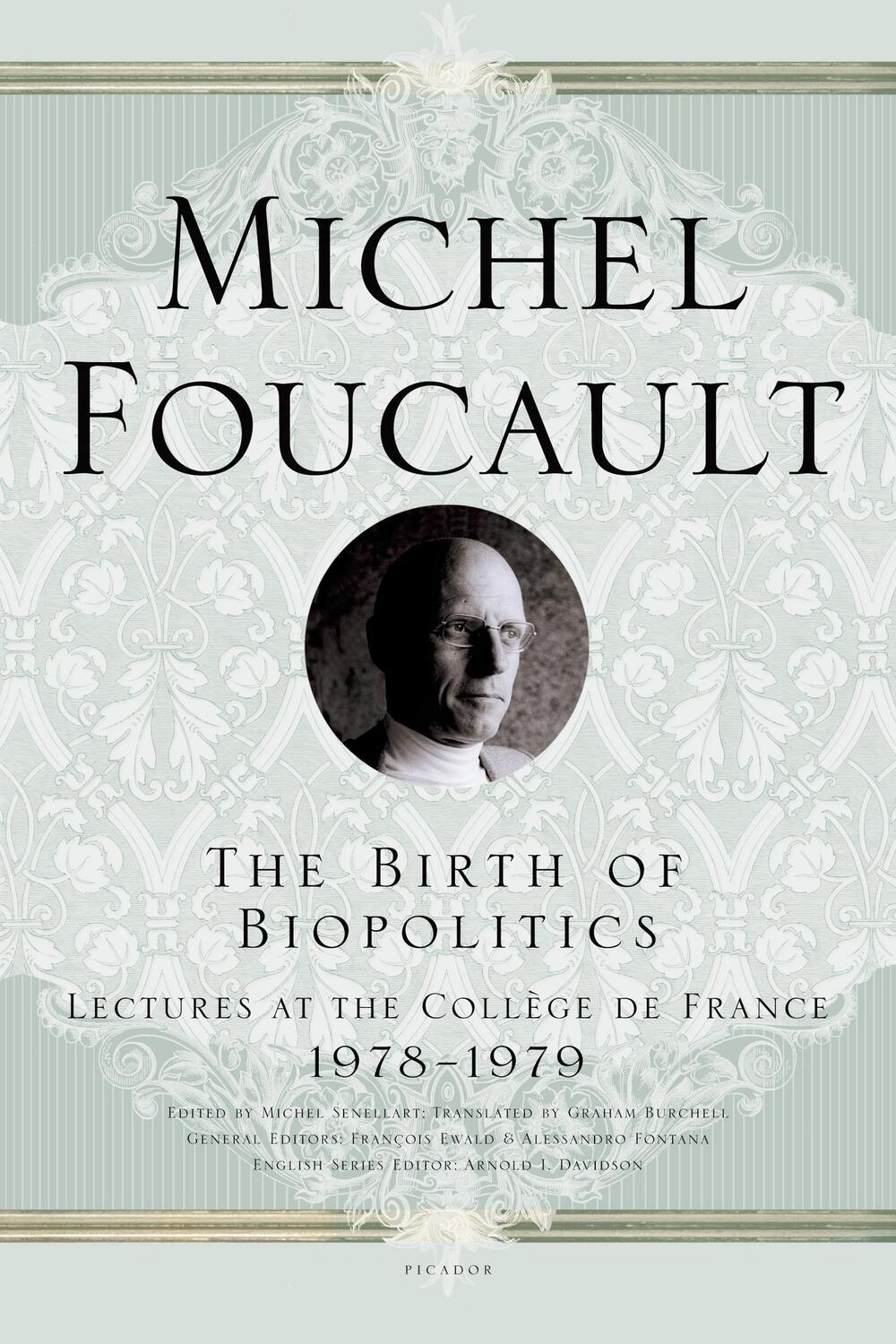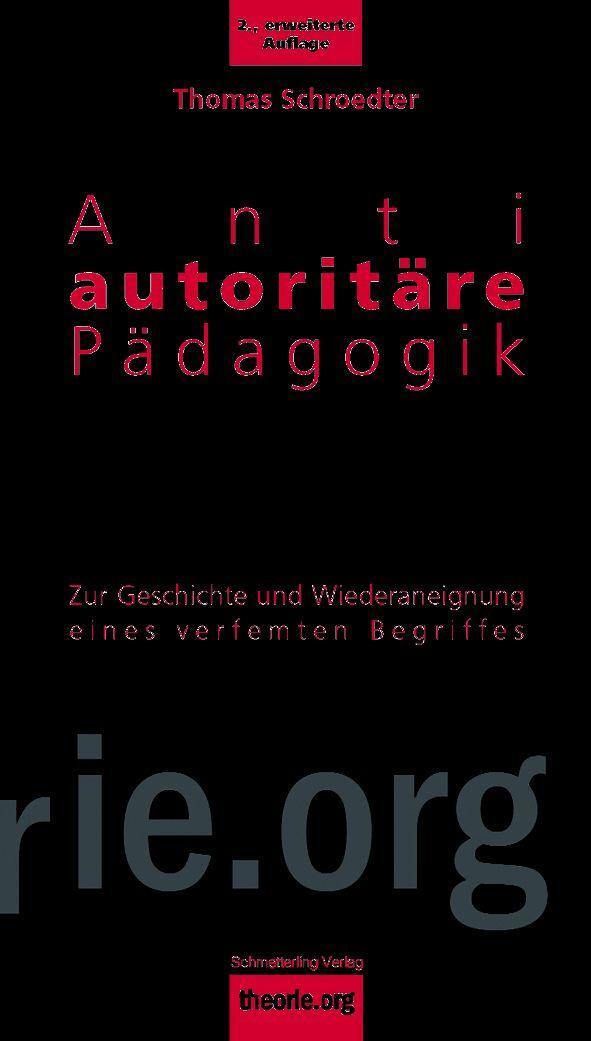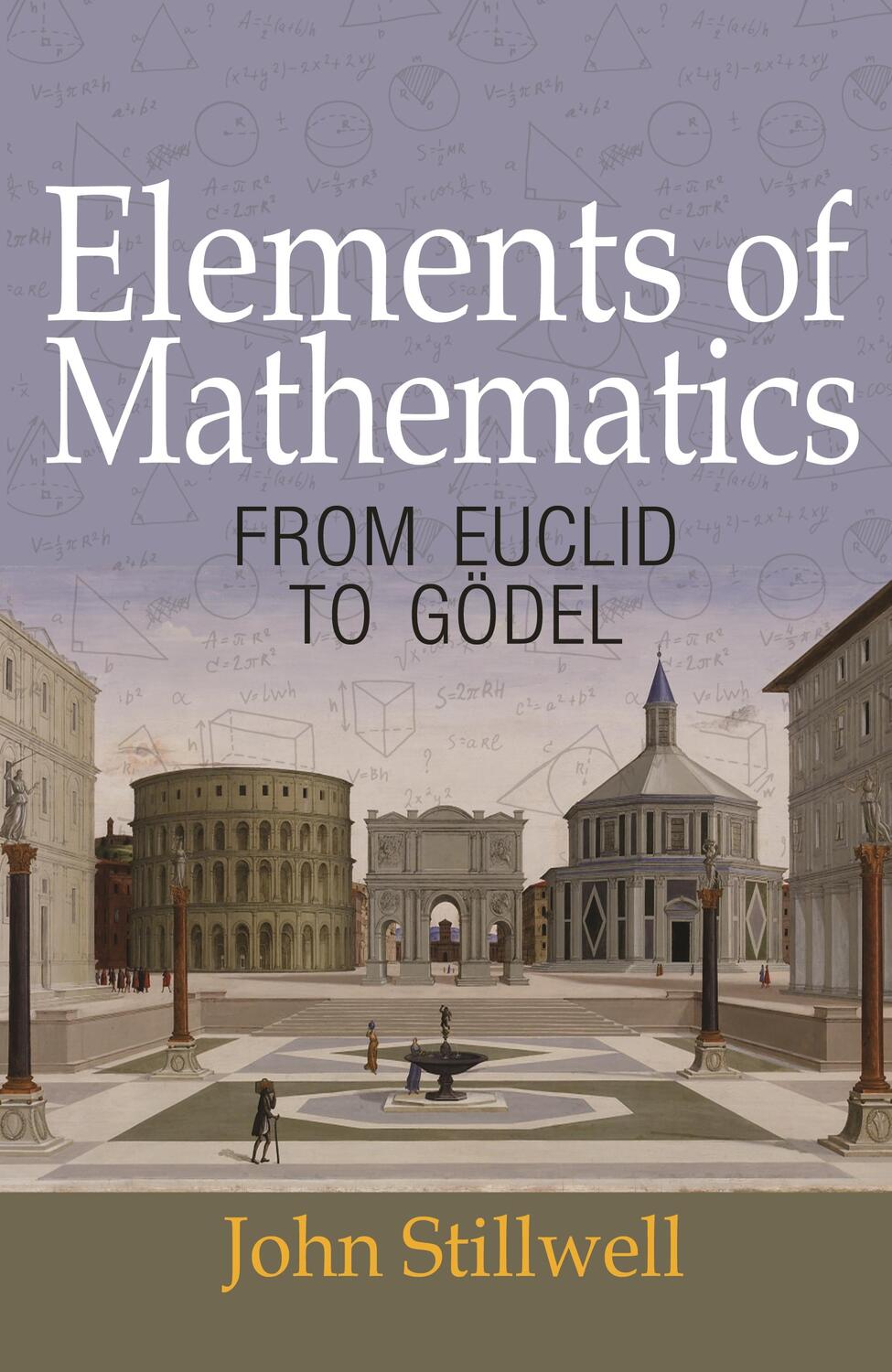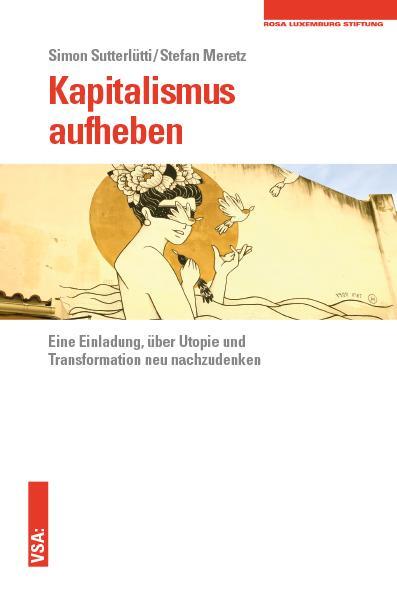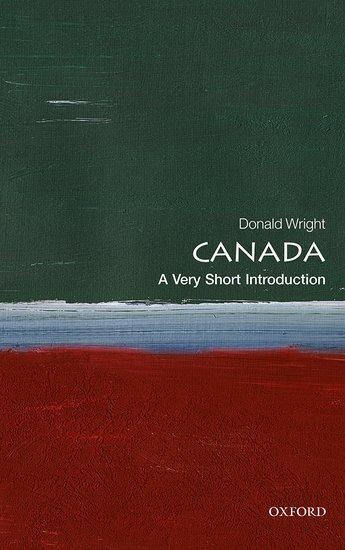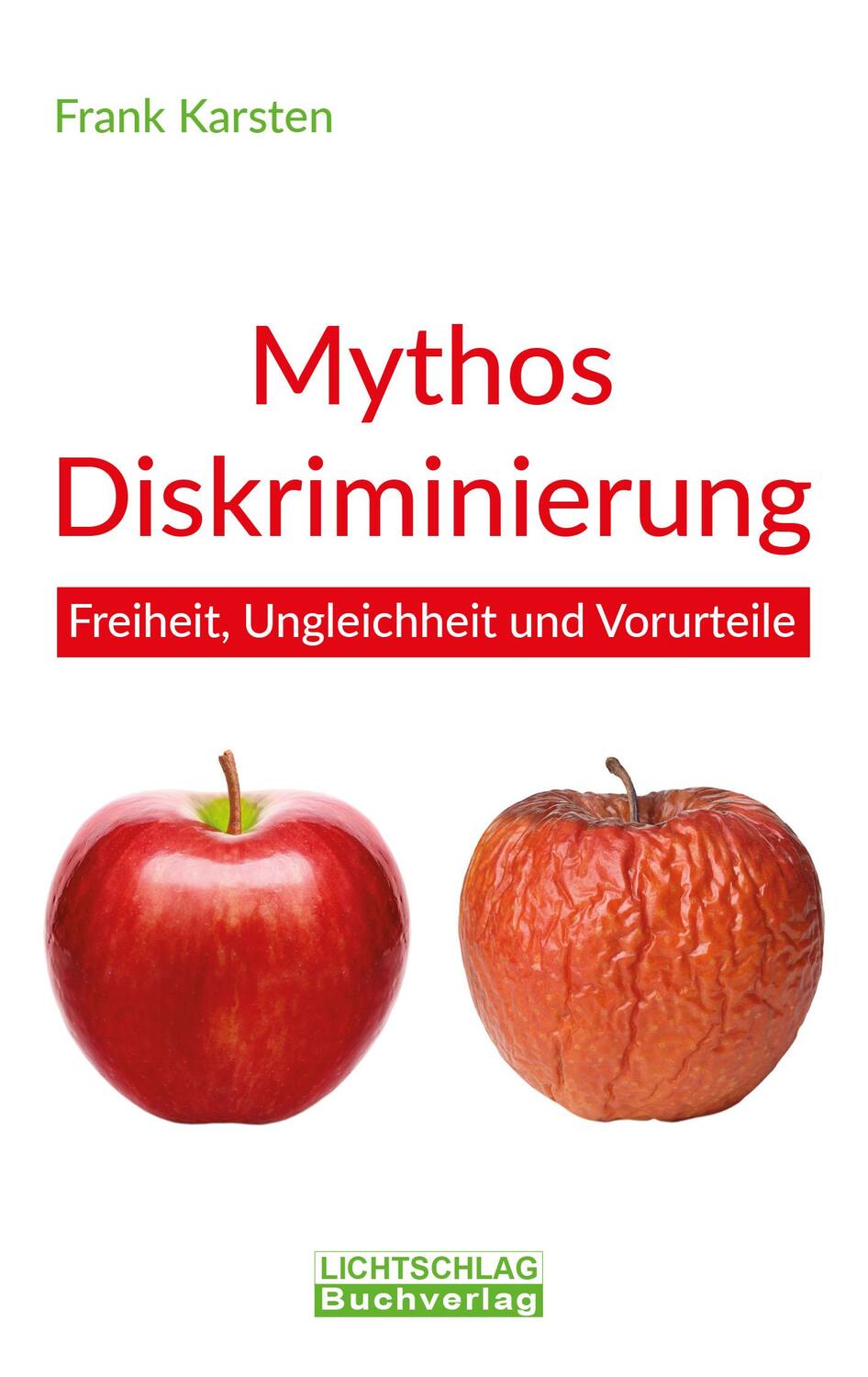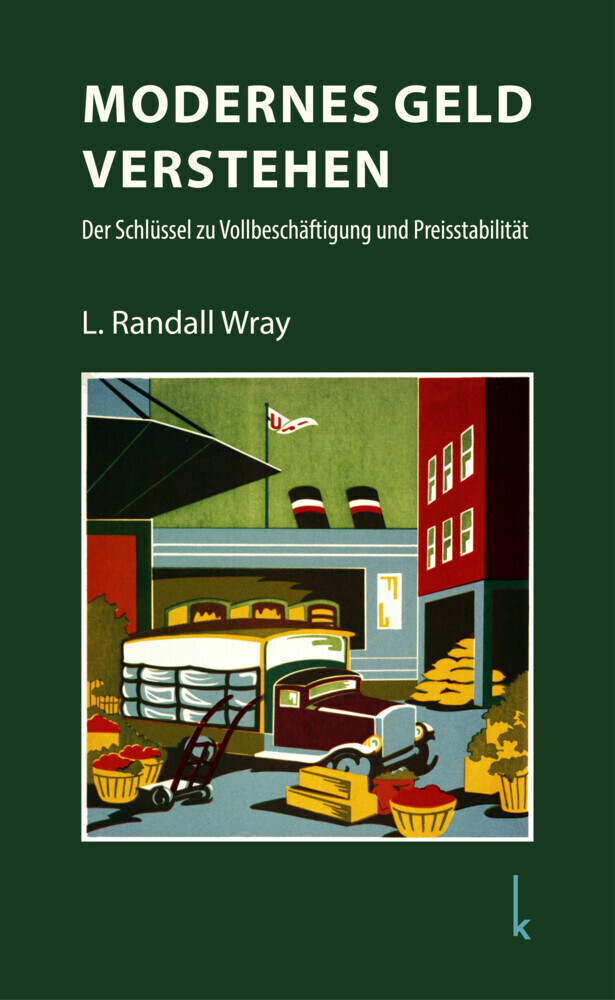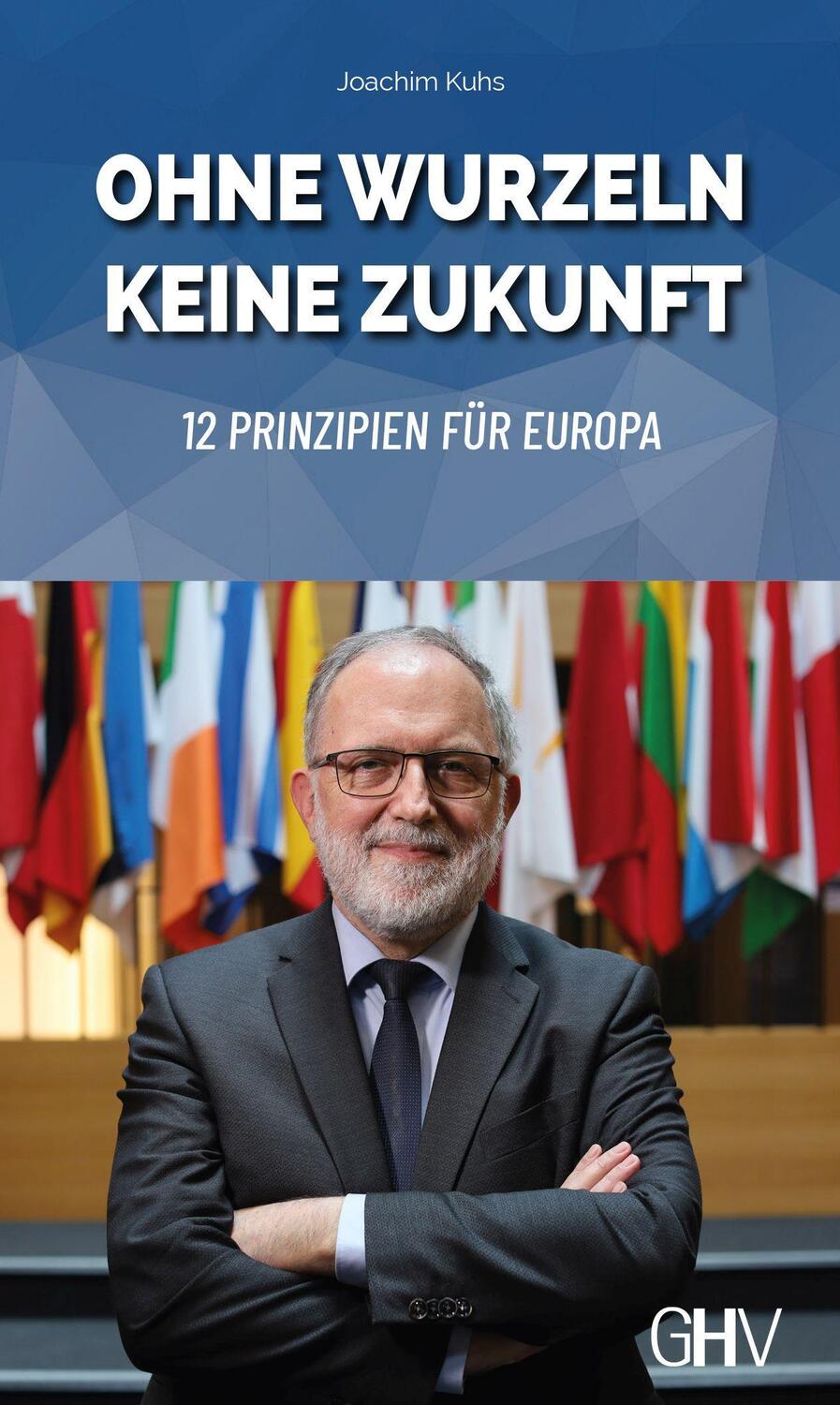Dekorationsartikel gehören nicht zum Leistungsumfang.
Sprache:
Englisch
24,50 €*
Versandkostenfrei per Post / DHL
Aktuell nicht verfügbar
Kategorien:
Beschreibung
Picador is proud to publish the sixth volume in Foucault's prestigious, groundbreaking series of lectures at the Collège de France from 1970 to 1984
The Birth of Biopolitics continues to pursue the themes of Foucault's lectures from Security, Territory, Population. Having shown how eighteenth-century political economy marks the birth of a new governmental rationality--seeking maximum effectiveness by governing less and in accordance with the naturalness of the phenomena to be governed--Michel Foucault undertakes a detailed analysis of the forms of this liberal governmentality. In a direct and conversational tone, this book raises questions of political philosophy and social policy that are at the heart of current debates about the role and status of neo-liberalism in twentieth century politics.
The Birth of Biopolitics continues to pursue the themes of Foucault's lectures from Security, Territory, Population. Having shown how eighteenth-century political economy marks the birth of a new governmental rationality--seeking maximum effectiveness by governing less and in accordance with the naturalness of the phenomena to be governed--Michel Foucault undertakes a detailed analysis of the forms of this liberal governmentality. In a direct and conversational tone, this book raises questions of political philosophy and social policy that are at the heart of current debates about the role and status of neo-liberalism in twentieth century politics.
Picador is proud to publish the sixth volume in Foucault's prestigious, groundbreaking series of lectures at the Collège de France from 1970 to 1984
The Birth of Biopolitics continues to pursue the themes of Foucault's lectures from Security, Territory, Population. Having shown how eighteenth-century political economy marks the birth of a new governmental rationality--seeking maximum effectiveness by governing less and in accordance with the naturalness of the phenomena to be governed--Michel Foucault undertakes a detailed analysis of the forms of this liberal governmentality. In a direct and conversational tone, this book raises questions of political philosophy and social policy that are at the heart of current debates about the role and status of neo-liberalism in twentieth century politics.
The Birth of Biopolitics continues to pursue the themes of Foucault's lectures from Security, Territory, Population. Having shown how eighteenth-century political economy marks the birth of a new governmental rationality--seeking maximum effectiveness by governing less and in accordance with the naturalness of the phenomena to be governed--Michel Foucault undertakes a detailed analysis of the forms of this liberal governmentality. In a direct and conversational tone, this book raises questions of political philosophy and social policy that are at the heart of current debates about the role and status of neo-liberalism in twentieth century politics.
Über den Autor
Michel Foucault
Inhaltsverzeichnis
Foreword: François Ewald and Alessandro Fontana
One: 10 January 1979
Questions of method. ¿ Suppose universals do not exist. ¿ Summary of the previous year's lectures: the limited objective of the government raison d'État (external politics) and unlimited objective of the police state (internal politics). ¿ Law as principle of the external limitation raison d'État. ¿ Perspective of this year's lectures: political economy as principle of the internal limitation of governmental reason. ¿ What is at stake in this research: the coupling of a set of practices and a regime of truth and the effects of its inscription in reality. ¿ What is liberalism.
Two: 17 January 1979Liberalism and the implementation of a new art of government in the eighteenth century. ¿ Specific features of the liberal art of government ( I ): ( 1 ) The constitution of the market as site of the formation of truth and not just as domain of jurisdiction. ¿ Questions of method. The stakes of research undertaken around madness, the penal order, and sexuality: sketch of a history of "regimes of verdiction." ¿ The nature of a political critique of knowledge (savoir). ¿ ( 2 ) The problem of limiting the exercise of power by public authorities. Two types of solution: French juridical radicalism and English utilitarianism. ¿ The question of "utility" and limiting the exercise of power by public authorities. ¿ Comment on the status of heterogeneity in history: strategic against dialectical logic. ¿ The notion of "interest" as operator (opérateur) of the new art of government.
Three: 24 January 1979Specific features of the liberal art of government ( II ): ( 3 ) The problem of European balance and international relations. ¿ Economic and political calculation in mercantilism. The principle of freedom of the market according to the physiocrats and Adam Smith: birth of a new European model. ¿ Appearance of a governmental rationality extended to a world scale. Examples: the question of maritime law; the projects of perpetual peace in the eighteenth century. ¿ Principles of the new liberal art of government: a "governmental naturalism"; the production of freedom. ¿ The problem of liberal arbitration. Its instruments: ( 1 ) the management of dangers and the implementation of mechanisms of security; ( 2 ) disciplinary controls (Bentham's panopticism); ( 3 ) inverventionist policies. ¿ The management of liberty and its crises.
Four: 31 January 1979Phobia of the state. ¿ Questions of method: sense and stakes of the bracketing off of a theory of the state in the analysis of mechanisms of power. ¿ Neo-liberal governmental practices: German liberalism from 1948 to 1962; American neo-liberalism. ¿ German neo-liberalism ( I ). Its political-economic context. ¿ The scientific council brought together by Erhard in 1947. Its program: abolition of price controls and limitation of governmental interventions. ¿ The middle way defined by Erhard in 1948 between anarchy and the "termite state". ¿ Its double meaning: ( a ) respect for economic freedom as condition of the state's political representativity; ( b) the institution of economic freedom as basis for the formation of political sovereignty. ¿ Fundamental characteristic of contemporary German governmentality: economic freedom, the source of juridical legitimacy and political consensus. ¿ Economic growth, axis of a new historical consciousness enabling the break with the past. ¿ Rallying of Christian Democracy and the SPD to liberal politics. ¿ The principles of liberal government and the absence of a socialist governmental rationality.
Five: 7 February 1979German neo-liberalism ( II ). ¿ Its problem: how can economic freedom both found and limit the state at the same time? ¿ The neo-liberal theorists: W. Eucken, F. Böhm, A. Müller-Armack, F. von Hayek. ¿ Max Weber and the problem of the irrational rationality of capitalism. The answers of the Frankfurt School and the Freiburg School. ¿ Nazism as necessary field of adversity to the definition of the neo-liberal critique of National Socialism on the basis of these different elements of German history. ¿ Theoretical consequences: extension of this critique to the New Deal and to the Beveridge plans; interventionism and the growth of the power of the state; massification and uniformization, effects of state control. ¿ The stake of neo-liberalism: its novelty in comparison with classical liberalism. The theory of pure competition.
Six: 14 February 1979German neo-liberalism ( III ). ¿ Usefulness of historical analyses for the present. ¿ How is neo-liberalism distinguished from classical liberalism? ¿ Its specific stake: how to model the global exercise of political power on the principles of a market economy, and the transformations that derive from this. ¿ The decoupling of the market economy and policies of laissez-faire. ¿ The Walter Lippmann colloquium ( 26 to 30 August 1938 ). ¿ The problem of the style of governmental action. Three examples: ( a ) the question of monopolies; ( b ) the question of "conformable actions ( actions conformes )." The bases of economic policy according to W. Eucken. Regulatory actions and organizing actions ( actions ordonnatrices ); ( c ) social policy. The ordoliberal critique of the welfare economy. ¿ Society as the point of application of governmental interventions. The "policy of society" ( Gesellschaftspolitik ). ¿ First aspect of this policy: the formalization of society on the model of the enterprise. ¿ Enterprise society and judicial society; two faces of a single phenomenon.
Seven: 21 February 1979Second aspect of the "policy of society" according to the neo-liberals: the problem of law in a society regulated according to the model of the competitive market economy. ¿ Return of Walter Lippmann colloquium. ¿ Reflections based on a text by Louis Rougier. ¿ ( 1 ) The idea of a juridical-economic order. Reciprocity of relations between economic processes and institutional framework. ¿ Political stake: the problem of the survival of capitalism. ¿ ( 2 ) The question of legal interventionism. ¿ Historical reminder: the Rule of law ( l'État de droit ) in the eighteenth century, in opposition to despotism and the police state. Re-elaboration of the notion in the nineteenth century: the question of arbitration between citizens and public authorities. The problem of administrative courts. ¿ The neo-liberal project: to introduce the principles of the Rule of law into the economic order. ¿ Rule of law and planning according to Hayek. ¿ ( 3 ) Growth of judicial demand. ¿ General conclusion: the specificity of the neo-liberal art of government in Germany. Ordoliberalism faced with the pessimism of Schumpeter.
Eight: 7 March 1979General remarks: ( 1 ) The methodological scope of the analysis of micro-powers. ( 2 ) The inflationism of state phobia. Its links with ordoliberalism. ¿ Two theses on the totalitarian state and the decline of state governmentality in the twentieth century. ¿ Remarks on the spread of the German model, in France and in the United States. ¿ The German neo-liberal model and the French project of a "social market economy." ¿ The French context of the transition to a neo-liberal economics. ¿ French social policy: the example of social security. ¿ The separation of the economic and the social according to Giscard d'Estaing. ¿ The project of a "negative tax" and its social and political stakes. "Relative" and "absolute" poverty. Abandonment of the policy of full employment.
Nine: 14 March 1979American neo-liberalism ( I ). Its context. ¿ The difference between American and European neo-liberalism. ¿ American neo-liberalism as a global claim, utopian focus, and method of thought. ¿ Aspects of this neo-liberalism: ( 1 ) The theory of human capital. The two processes that it represents: ( a ) an extension of economic analysis within its own domain: criticism of the classical analysis of labor in terms of the time factor; ( b ) an extension of economic analysis to domains previously considered to be non-economic. ¿ The epistemological transformation produced by neo-liberal analysis: from the analysis of economic processes to the analysis of the internal rationality of human behavior. ¿ Work as economic conduct. ¿ Its division into capital, abilities, and income. ¿ The redefinition of homo oeconomicus as entrepreneur of himself. ¿ The notion of "human capital." Its constitutive elements: ( a ) innate elements and the question of the improvement of genetic human capital; ( b ) acquired elements and the problem of the formation of human capital (education, health, etcetera). ¿ The interest of these analyses: resumption of the problem of social and economic innovation ( Schumpeter ). A new conception of the policy of growth.
Ten: 21 March 1979American neo-liberalism ( II ). ¿ The application of the economic grid to social phenomena. ¿ Return to the ordoliberal problematic: the ambiguities of the Gesellschaftspolitik. The generalization of the "enterprise" form in the social field. Economic policy and Vitalpolitik: a society for the market and against the market. ¿ The unlimited generalization of the economic form of the market in American neo-liberalism: principle of the intelligibility of individual behavior and critical principle of governmental interventions. ¿ Aspects of American neo-liberalism: ( 2 ) Delinquency and penal policy. ¿ Historical reminder: the problem of the reform of penal law at the end of the eighteenth century. Economic calculation and principle of legality. The parasitic invasion of the law by the norm in the nineteenth century and the birth of criminal anthropology. ¿ The neo-liberal analysis: ( 1 ) the definition of crime; ( 2 ) the description of the criminal subject as homo oeconomicus; ( 3 ) the status of the penalty as instrument of law "enforcement." The example of the drugs market. ¿ Consequences of this analysis: ( a ) anthropological...
One: 10 January 1979
Questions of method. ¿ Suppose universals do not exist. ¿ Summary of the previous year's lectures: the limited objective of the government raison d'État (external politics) and unlimited objective of the police state (internal politics). ¿ Law as principle of the external limitation raison d'État. ¿ Perspective of this year's lectures: political economy as principle of the internal limitation of governmental reason. ¿ What is at stake in this research: the coupling of a set of practices and a regime of truth and the effects of its inscription in reality. ¿ What is liberalism.
Two: 17 January 1979Liberalism and the implementation of a new art of government in the eighteenth century. ¿ Specific features of the liberal art of government ( I ): ( 1 ) The constitution of the market as site of the formation of truth and not just as domain of jurisdiction. ¿ Questions of method. The stakes of research undertaken around madness, the penal order, and sexuality: sketch of a history of "regimes of verdiction." ¿ The nature of a political critique of knowledge (savoir). ¿ ( 2 ) The problem of limiting the exercise of power by public authorities. Two types of solution: French juridical radicalism and English utilitarianism. ¿ The question of "utility" and limiting the exercise of power by public authorities. ¿ Comment on the status of heterogeneity in history: strategic against dialectical logic. ¿ The notion of "interest" as operator (opérateur) of the new art of government.
Three: 24 January 1979Specific features of the liberal art of government ( II ): ( 3 ) The problem of European balance and international relations. ¿ Economic and political calculation in mercantilism. The principle of freedom of the market according to the physiocrats and Adam Smith: birth of a new European model. ¿ Appearance of a governmental rationality extended to a world scale. Examples: the question of maritime law; the projects of perpetual peace in the eighteenth century. ¿ Principles of the new liberal art of government: a "governmental naturalism"; the production of freedom. ¿ The problem of liberal arbitration. Its instruments: ( 1 ) the management of dangers and the implementation of mechanisms of security; ( 2 ) disciplinary controls (Bentham's panopticism); ( 3 ) inverventionist policies. ¿ The management of liberty and its crises.
Four: 31 January 1979Phobia of the state. ¿ Questions of method: sense and stakes of the bracketing off of a theory of the state in the analysis of mechanisms of power. ¿ Neo-liberal governmental practices: German liberalism from 1948 to 1962; American neo-liberalism. ¿ German neo-liberalism ( I ). Its political-economic context. ¿ The scientific council brought together by Erhard in 1947. Its program: abolition of price controls and limitation of governmental interventions. ¿ The middle way defined by Erhard in 1948 between anarchy and the "termite state". ¿ Its double meaning: ( a ) respect for economic freedom as condition of the state's political representativity; ( b) the institution of economic freedom as basis for the formation of political sovereignty. ¿ Fundamental characteristic of contemporary German governmentality: economic freedom, the source of juridical legitimacy and political consensus. ¿ Economic growth, axis of a new historical consciousness enabling the break with the past. ¿ Rallying of Christian Democracy and the SPD to liberal politics. ¿ The principles of liberal government and the absence of a socialist governmental rationality.
Five: 7 February 1979German neo-liberalism ( II ). ¿ Its problem: how can economic freedom both found and limit the state at the same time? ¿ The neo-liberal theorists: W. Eucken, F. Böhm, A. Müller-Armack, F. von Hayek. ¿ Max Weber and the problem of the irrational rationality of capitalism. The answers of the Frankfurt School and the Freiburg School. ¿ Nazism as necessary field of adversity to the definition of the neo-liberal critique of National Socialism on the basis of these different elements of German history. ¿ Theoretical consequences: extension of this critique to the New Deal and to the Beveridge plans; interventionism and the growth of the power of the state; massification and uniformization, effects of state control. ¿ The stake of neo-liberalism: its novelty in comparison with classical liberalism. The theory of pure competition.
Six: 14 February 1979German neo-liberalism ( III ). ¿ Usefulness of historical analyses for the present. ¿ How is neo-liberalism distinguished from classical liberalism? ¿ Its specific stake: how to model the global exercise of political power on the principles of a market economy, and the transformations that derive from this. ¿ The decoupling of the market economy and policies of laissez-faire. ¿ The Walter Lippmann colloquium ( 26 to 30 August 1938 ). ¿ The problem of the style of governmental action. Three examples: ( a ) the question of monopolies; ( b ) the question of "conformable actions ( actions conformes )." The bases of economic policy according to W. Eucken. Regulatory actions and organizing actions ( actions ordonnatrices ); ( c ) social policy. The ordoliberal critique of the welfare economy. ¿ Society as the point of application of governmental interventions. The "policy of society" ( Gesellschaftspolitik ). ¿ First aspect of this policy: the formalization of society on the model of the enterprise. ¿ Enterprise society and judicial society; two faces of a single phenomenon.
Seven: 21 February 1979Second aspect of the "policy of society" according to the neo-liberals: the problem of law in a society regulated according to the model of the competitive market economy. ¿ Return of Walter Lippmann colloquium. ¿ Reflections based on a text by Louis Rougier. ¿ ( 1 ) The idea of a juridical-economic order. Reciprocity of relations between economic processes and institutional framework. ¿ Political stake: the problem of the survival of capitalism. ¿ ( 2 ) The question of legal interventionism. ¿ Historical reminder: the Rule of law ( l'État de droit ) in the eighteenth century, in opposition to despotism and the police state. Re-elaboration of the notion in the nineteenth century: the question of arbitration between citizens and public authorities. The problem of administrative courts. ¿ The neo-liberal project: to introduce the principles of the Rule of law into the economic order. ¿ Rule of law and planning according to Hayek. ¿ ( 3 ) Growth of judicial demand. ¿ General conclusion: the specificity of the neo-liberal art of government in Germany. Ordoliberalism faced with the pessimism of Schumpeter.
Eight: 7 March 1979General remarks: ( 1 ) The methodological scope of the analysis of micro-powers. ( 2 ) The inflationism of state phobia. Its links with ordoliberalism. ¿ Two theses on the totalitarian state and the decline of state governmentality in the twentieth century. ¿ Remarks on the spread of the German model, in France and in the United States. ¿ The German neo-liberal model and the French project of a "social market economy." ¿ The French context of the transition to a neo-liberal economics. ¿ French social policy: the example of social security. ¿ The separation of the economic and the social according to Giscard d'Estaing. ¿ The project of a "negative tax" and its social and political stakes. "Relative" and "absolute" poverty. Abandonment of the policy of full employment.
Nine: 14 March 1979American neo-liberalism ( I ). Its context. ¿ The difference between American and European neo-liberalism. ¿ American neo-liberalism as a global claim, utopian focus, and method of thought. ¿ Aspects of this neo-liberalism: ( 1 ) The theory of human capital. The two processes that it represents: ( a ) an extension of economic analysis within its own domain: criticism of the classical analysis of labor in terms of the time factor; ( b ) an extension of economic analysis to domains previously considered to be non-economic. ¿ The epistemological transformation produced by neo-liberal analysis: from the analysis of economic processes to the analysis of the internal rationality of human behavior. ¿ Work as economic conduct. ¿ Its division into capital, abilities, and income. ¿ The redefinition of homo oeconomicus as entrepreneur of himself. ¿ The notion of "human capital." Its constitutive elements: ( a ) innate elements and the question of the improvement of genetic human capital; ( b ) acquired elements and the problem of the formation of human capital (education, health, etcetera). ¿ The interest of these analyses: resumption of the problem of social and economic innovation ( Schumpeter ). A new conception of the policy of growth.
Ten: 21 March 1979American neo-liberalism ( II ). ¿ The application of the economic grid to social phenomena. ¿ Return to the ordoliberal problematic: the ambiguities of the Gesellschaftspolitik. The generalization of the "enterprise" form in the social field. Economic policy and Vitalpolitik: a society for the market and against the market. ¿ The unlimited generalization of the economic form of the market in American neo-liberalism: principle of the intelligibility of individual behavior and critical principle of governmental interventions. ¿ Aspects of American neo-liberalism: ( 2 ) Delinquency and penal policy. ¿ Historical reminder: the problem of the reform of penal law at the end of the eighteenth century. Economic calculation and principle of legality. The parasitic invasion of the law by the norm in the nineteenth century and the birth of criminal anthropology. ¿ The neo-liberal analysis: ( 1 ) the definition of crime; ( 2 ) the description of the criminal subject as homo oeconomicus; ( 3 ) the status of the penalty as instrument of law "enforcement." The example of the drugs market. ¿ Consequences of this analysis: ( a ) anthropological...
Details
| Erscheinungsjahr: | 2010 |
|---|---|
| Genre: | Politikwissenschaften |
| Rubrik: | Wissenschaften |
| Medium: | Taschenbuch |
| Seiten: | 368 |
| ISBN-13: | 9780312203412 |
| ISBN-10: | 0312203411 |
| Sprache: | Englisch |
| Einband: | Kartoniert / Broschiert |
| Autor: | Foucault, Michel |
| Hersteller: | Picador USA |
| Maße: | 208 x 140 x 30 mm |
| Von/Mit: | Michel Foucault |
| Erscheinungsdatum: | 02.03.2010 |
| Gewicht: | 0,329 kg |
Über den Autor
Michel Foucault
Inhaltsverzeichnis
Foreword: François Ewald and Alessandro Fontana
One: 10 January 1979
Questions of method. ¿ Suppose universals do not exist. ¿ Summary of the previous year's lectures: the limited objective of the government raison d'État (external politics) and unlimited objective of the police state (internal politics). ¿ Law as principle of the external limitation raison d'État. ¿ Perspective of this year's lectures: political economy as principle of the internal limitation of governmental reason. ¿ What is at stake in this research: the coupling of a set of practices and a regime of truth and the effects of its inscription in reality. ¿ What is liberalism.
Two: 17 January 1979Liberalism and the implementation of a new art of government in the eighteenth century. ¿ Specific features of the liberal art of government ( I ): ( 1 ) The constitution of the market as site of the formation of truth and not just as domain of jurisdiction. ¿ Questions of method. The stakes of research undertaken around madness, the penal order, and sexuality: sketch of a history of "regimes of verdiction." ¿ The nature of a political critique of knowledge (savoir). ¿ ( 2 ) The problem of limiting the exercise of power by public authorities. Two types of solution: French juridical radicalism and English utilitarianism. ¿ The question of "utility" and limiting the exercise of power by public authorities. ¿ Comment on the status of heterogeneity in history: strategic against dialectical logic. ¿ The notion of "interest" as operator (opérateur) of the new art of government.
Three: 24 January 1979Specific features of the liberal art of government ( II ): ( 3 ) The problem of European balance and international relations. ¿ Economic and political calculation in mercantilism. The principle of freedom of the market according to the physiocrats and Adam Smith: birth of a new European model. ¿ Appearance of a governmental rationality extended to a world scale. Examples: the question of maritime law; the projects of perpetual peace in the eighteenth century. ¿ Principles of the new liberal art of government: a "governmental naturalism"; the production of freedom. ¿ The problem of liberal arbitration. Its instruments: ( 1 ) the management of dangers and the implementation of mechanisms of security; ( 2 ) disciplinary controls (Bentham's panopticism); ( 3 ) inverventionist policies. ¿ The management of liberty and its crises.
Four: 31 January 1979Phobia of the state. ¿ Questions of method: sense and stakes of the bracketing off of a theory of the state in the analysis of mechanisms of power. ¿ Neo-liberal governmental practices: German liberalism from 1948 to 1962; American neo-liberalism. ¿ German neo-liberalism ( I ). Its political-economic context. ¿ The scientific council brought together by Erhard in 1947. Its program: abolition of price controls and limitation of governmental interventions. ¿ The middle way defined by Erhard in 1948 between anarchy and the "termite state". ¿ Its double meaning: ( a ) respect for economic freedom as condition of the state's political representativity; ( b) the institution of economic freedom as basis for the formation of political sovereignty. ¿ Fundamental characteristic of contemporary German governmentality: economic freedom, the source of juridical legitimacy and political consensus. ¿ Economic growth, axis of a new historical consciousness enabling the break with the past. ¿ Rallying of Christian Democracy and the SPD to liberal politics. ¿ The principles of liberal government and the absence of a socialist governmental rationality.
Five: 7 February 1979German neo-liberalism ( II ). ¿ Its problem: how can economic freedom both found and limit the state at the same time? ¿ The neo-liberal theorists: W. Eucken, F. Böhm, A. Müller-Armack, F. von Hayek. ¿ Max Weber and the problem of the irrational rationality of capitalism. The answers of the Frankfurt School and the Freiburg School. ¿ Nazism as necessary field of adversity to the definition of the neo-liberal critique of National Socialism on the basis of these different elements of German history. ¿ Theoretical consequences: extension of this critique to the New Deal and to the Beveridge plans; interventionism and the growth of the power of the state; massification and uniformization, effects of state control. ¿ The stake of neo-liberalism: its novelty in comparison with classical liberalism. The theory of pure competition.
Six: 14 February 1979German neo-liberalism ( III ). ¿ Usefulness of historical analyses for the present. ¿ How is neo-liberalism distinguished from classical liberalism? ¿ Its specific stake: how to model the global exercise of political power on the principles of a market economy, and the transformations that derive from this. ¿ The decoupling of the market economy and policies of laissez-faire. ¿ The Walter Lippmann colloquium ( 26 to 30 August 1938 ). ¿ The problem of the style of governmental action. Three examples: ( a ) the question of monopolies; ( b ) the question of "conformable actions ( actions conformes )." The bases of economic policy according to W. Eucken. Regulatory actions and organizing actions ( actions ordonnatrices ); ( c ) social policy. The ordoliberal critique of the welfare economy. ¿ Society as the point of application of governmental interventions. The "policy of society" ( Gesellschaftspolitik ). ¿ First aspect of this policy: the formalization of society on the model of the enterprise. ¿ Enterprise society and judicial society; two faces of a single phenomenon.
Seven: 21 February 1979Second aspect of the "policy of society" according to the neo-liberals: the problem of law in a society regulated according to the model of the competitive market economy. ¿ Return of Walter Lippmann colloquium. ¿ Reflections based on a text by Louis Rougier. ¿ ( 1 ) The idea of a juridical-economic order. Reciprocity of relations between economic processes and institutional framework. ¿ Political stake: the problem of the survival of capitalism. ¿ ( 2 ) The question of legal interventionism. ¿ Historical reminder: the Rule of law ( l'État de droit ) in the eighteenth century, in opposition to despotism and the police state. Re-elaboration of the notion in the nineteenth century: the question of arbitration between citizens and public authorities. The problem of administrative courts. ¿ The neo-liberal project: to introduce the principles of the Rule of law into the economic order. ¿ Rule of law and planning according to Hayek. ¿ ( 3 ) Growth of judicial demand. ¿ General conclusion: the specificity of the neo-liberal art of government in Germany. Ordoliberalism faced with the pessimism of Schumpeter.
Eight: 7 March 1979General remarks: ( 1 ) The methodological scope of the analysis of micro-powers. ( 2 ) The inflationism of state phobia. Its links with ordoliberalism. ¿ Two theses on the totalitarian state and the decline of state governmentality in the twentieth century. ¿ Remarks on the spread of the German model, in France and in the United States. ¿ The German neo-liberal model and the French project of a "social market economy." ¿ The French context of the transition to a neo-liberal economics. ¿ French social policy: the example of social security. ¿ The separation of the economic and the social according to Giscard d'Estaing. ¿ The project of a "negative tax" and its social and political stakes. "Relative" and "absolute" poverty. Abandonment of the policy of full employment.
Nine: 14 March 1979American neo-liberalism ( I ). Its context. ¿ The difference between American and European neo-liberalism. ¿ American neo-liberalism as a global claim, utopian focus, and method of thought. ¿ Aspects of this neo-liberalism: ( 1 ) The theory of human capital. The two processes that it represents: ( a ) an extension of economic analysis within its own domain: criticism of the classical analysis of labor in terms of the time factor; ( b ) an extension of economic analysis to domains previously considered to be non-economic. ¿ The epistemological transformation produced by neo-liberal analysis: from the analysis of economic processes to the analysis of the internal rationality of human behavior. ¿ Work as economic conduct. ¿ Its division into capital, abilities, and income. ¿ The redefinition of homo oeconomicus as entrepreneur of himself. ¿ The notion of "human capital." Its constitutive elements: ( a ) innate elements and the question of the improvement of genetic human capital; ( b ) acquired elements and the problem of the formation of human capital (education, health, etcetera). ¿ The interest of these analyses: resumption of the problem of social and economic innovation ( Schumpeter ). A new conception of the policy of growth.
Ten: 21 March 1979American neo-liberalism ( II ). ¿ The application of the economic grid to social phenomena. ¿ Return to the ordoliberal problematic: the ambiguities of the Gesellschaftspolitik. The generalization of the "enterprise" form in the social field. Economic policy and Vitalpolitik: a society for the market and against the market. ¿ The unlimited generalization of the economic form of the market in American neo-liberalism: principle of the intelligibility of individual behavior and critical principle of governmental interventions. ¿ Aspects of American neo-liberalism: ( 2 ) Delinquency and penal policy. ¿ Historical reminder: the problem of the reform of penal law at the end of the eighteenth century. Economic calculation and principle of legality. The parasitic invasion of the law by the norm in the nineteenth century and the birth of criminal anthropology. ¿ The neo-liberal analysis: ( 1 ) the definition of crime; ( 2 ) the description of the criminal subject as homo oeconomicus; ( 3 ) the status of the penalty as instrument of law "enforcement." The example of the drugs market. ¿ Consequences of this analysis: ( a ) anthropological...
One: 10 January 1979
Questions of method. ¿ Suppose universals do not exist. ¿ Summary of the previous year's lectures: the limited objective of the government raison d'État (external politics) and unlimited objective of the police state (internal politics). ¿ Law as principle of the external limitation raison d'État. ¿ Perspective of this year's lectures: political economy as principle of the internal limitation of governmental reason. ¿ What is at stake in this research: the coupling of a set of practices and a regime of truth and the effects of its inscription in reality. ¿ What is liberalism.
Two: 17 January 1979Liberalism and the implementation of a new art of government in the eighteenth century. ¿ Specific features of the liberal art of government ( I ): ( 1 ) The constitution of the market as site of the formation of truth and not just as domain of jurisdiction. ¿ Questions of method. The stakes of research undertaken around madness, the penal order, and sexuality: sketch of a history of "regimes of verdiction." ¿ The nature of a political critique of knowledge (savoir). ¿ ( 2 ) The problem of limiting the exercise of power by public authorities. Two types of solution: French juridical radicalism and English utilitarianism. ¿ The question of "utility" and limiting the exercise of power by public authorities. ¿ Comment on the status of heterogeneity in history: strategic against dialectical logic. ¿ The notion of "interest" as operator (opérateur) of the new art of government.
Three: 24 January 1979Specific features of the liberal art of government ( II ): ( 3 ) The problem of European balance and international relations. ¿ Economic and political calculation in mercantilism. The principle of freedom of the market according to the physiocrats and Adam Smith: birth of a new European model. ¿ Appearance of a governmental rationality extended to a world scale. Examples: the question of maritime law; the projects of perpetual peace in the eighteenth century. ¿ Principles of the new liberal art of government: a "governmental naturalism"; the production of freedom. ¿ The problem of liberal arbitration. Its instruments: ( 1 ) the management of dangers and the implementation of mechanisms of security; ( 2 ) disciplinary controls (Bentham's panopticism); ( 3 ) inverventionist policies. ¿ The management of liberty and its crises.
Four: 31 January 1979Phobia of the state. ¿ Questions of method: sense and stakes of the bracketing off of a theory of the state in the analysis of mechanisms of power. ¿ Neo-liberal governmental practices: German liberalism from 1948 to 1962; American neo-liberalism. ¿ German neo-liberalism ( I ). Its political-economic context. ¿ The scientific council brought together by Erhard in 1947. Its program: abolition of price controls and limitation of governmental interventions. ¿ The middle way defined by Erhard in 1948 between anarchy and the "termite state". ¿ Its double meaning: ( a ) respect for economic freedom as condition of the state's political representativity; ( b) the institution of economic freedom as basis for the formation of political sovereignty. ¿ Fundamental characteristic of contemporary German governmentality: economic freedom, the source of juridical legitimacy and political consensus. ¿ Economic growth, axis of a new historical consciousness enabling the break with the past. ¿ Rallying of Christian Democracy and the SPD to liberal politics. ¿ The principles of liberal government and the absence of a socialist governmental rationality.
Five: 7 February 1979German neo-liberalism ( II ). ¿ Its problem: how can economic freedom both found and limit the state at the same time? ¿ The neo-liberal theorists: W. Eucken, F. Böhm, A. Müller-Armack, F. von Hayek. ¿ Max Weber and the problem of the irrational rationality of capitalism. The answers of the Frankfurt School and the Freiburg School. ¿ Nazism as necessary field of adversity to the definition of the neo-liberal critique of National Socialism on the basis of these different elements of German history. ¿ Theoretical consequences: extension of this critique to the New Deal and to the Beveridge plans; interventionism and the growth of the power of the state; massification and uniformization, effects of state control. ¿ The stake of neo-liberalism: its novelty in comparison with classical liberalism. The theory of pure competition.
Six: 14 February 1979German neo-liberalism ( III ). ¿ Usefulness of historical analyses for the present. ¿ How is neo-liberalism distinguished from classical liberalism? ¿ Its specific stake: how to model the global exercise of political power on the principles of a market economy, and the transformations that derive from this. ¿ The decoupling of the market economy and policies of laissez-faire. ¿ The Walter Lippmann colloquium ( 26 to 30 August 1938 ). ¿ The problem of the style of governmental action. Three examples: ( a ) the question of monopolies; ( b ) the question of "conformable actions ( actions conformes )." The bases of economic policy according to W. Eucken. Regulatory actions and organizing actions ( actions ordonnatrices ); ( c ) social policy. The ordoliberal critique of the welfare economy. ¿ Society as the point of application of governmental interventions. The "policy of society" ( Gesellschaftspolitik ). ¿ First aspect of this policy: the formalization of society on the model of the enterprise. ¿ Enterprise society and judicial society; two faces of a single phenomenon.
Seven: 21 February 1979Second aspect of the "policy of society" according to the neo-liberals: the problem of law in a society regulated according to the model of the competitive market economy. ¿ Return of Walter Lippmann colloquium. ¿ Reflections based on a text by Louis Rougier. ¿ ( 1 ) The idea of a juridical-economic order. Reciprocity of relations between economic processes and institutional framework. ¿ Political stake: the problem of the survival of capitalism. ¿ ( 2 ) The question of legal interventionism. ¿ Historical reminder: the Rule of law ( l'État de droit ) in the eighteenth century, in opposition to despotism and the police state. Re-elaboration of the notion in the nineteenth century: the question of arbitration between citizens and public authorities. The problem of administrative courts. ¿ The neo-liberal project: to introduce the principles of the Rule of law into the economic order. ¿ Rule of law and planning according to Hayek. ¿ ( 3 ) Growth of judicial demand. ¿ General conclusion: the specificity of the neo-liberal art of government in Germany. Ordoliberalism faced with the pessimism of Schumpeter.
Eight: 7 March 1979General remarks: ( 1 ) The methodological scope of the analysis of micro-powers. ( 2 ) The inflationism of state phobia. Its links with ordoliberalism. ¿ Two theses on the totalitarian state and the decline of state governmentality in the twentieth century. ¿ Remarks on the spread of the German model, in France and in the United States. ¿ The German neo-liberal model and the French project of a "social market economy." ¿ The French context of the transition to a neo-liberal economics. ¿ French social policy: the example of social security. ¿ The separation of the economic and the social according to Giscard d'Estaing. ¿ The project of a "negative tax" and its social and political stakes. "Relative" and "absolute" poverty. Abandonment of the policy of full employment.
Nine: 14 March 1979American neo-liberalism ( I ). Its context. ¿ The difference between American and European neo-liberalism. ¿ American neo-liberalism as a global claim, utopian focus, and method of thought. ¿ Aspects of this neo-liberalism: ( 1 ) The theory of human capital. The two processes that it represents: ( a ) an extension of economic analysis within its own domain: criticism of the classical analysis of labor in terms of the time factor; ( b ) an extension of economic analysis to domains previously considered to be non-economic. ¿ The epistemological transformation produced by neo-liberal analysis: from the analysis of economic processes to the analysis of the internal rationality of human behavior. ¿ Work as economic conduct. ¿ Its division into capital, abilities, and income. ¿ The redefinition of homo oeconomicus as entrepreneur of himself. ¿ The notion of "human capital." Its constitutive elements: ( a ) innate elements and the question of the improvement of genetic human capital; ( b ) acquired elements and the problem of the formation of human capital (education, health, etcetera). ¿ The interest of these analyses: resumption of the problem of social and economic innovation ( Schumpeter ). A new conception of the policy of growth.
Ten: 21 March 1979American neo-liberalism ( II ). ¿ The application of the economic grid to social phenomena. ¿ Return to the ordoliberal problematic: the ambiguities of the Gesellschaftspolitik. The generalization of the "enterprise" form in the social field. Economic policy and Vitalpolitik: a society for the market and against the market. ¿ The unlimited generalization of the economic form of the market in American neo-liberalism: principle of the intelligibility of individual behavior and critical principle of governmental interventions. ¿ Aspects of American neo-liberalism: ( 2 ) Delinquency and penal policy. ¿ Historical reminder: the problem of the reform of penal law at the end of the eighteenth century. Economic calculation and principle of legality. The parasitic invasion of the law by the norm in the nineteenth century and the birth of criminal anthropology. ¿ The neo-liberal analysis: ( 1 ) the definition of crime; ( 2 ) the description of the criminal subject as homo oeconomicus; ( 3 ) the status of the penalty as instrument of law "enforcement." The example of the drugs market. ¿ Consequences of this analysis: ( a ) anthropological...
Details
| Erscheinungsjahr: | 2010 |
|---|---|
| Genre: | Politikwissenschaften |
| Rubrik: | Wissenschaften |
| Medium: | Taschenbuch |
| Seiten: | 368 |
| ISBN-13: | 9780312203412 |
| ISBN-10: | 0312203411 |
| Sprache: | Englisch |
| Einband: | Kartoniert / Broschiert |
| Autor: | Foucault, Michel |
| Hersteller: | Picador USA |
| Maße: | 208 x 140 x 30 mm |
| Von/Mit: | Michel Foucault |
| Erscheinungsdatum: | 02.03.2010 |
| Gewicht: | 0,329 kg |
Warnhinweis

